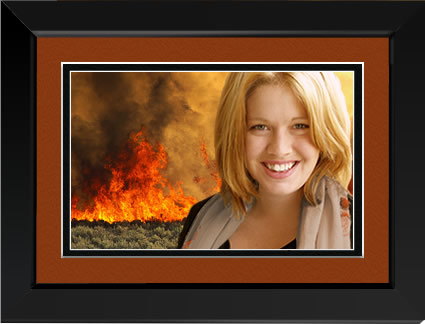In Profile: Dr. Robin Verble-Pearson
Fire Caused Changes in Ecosystems and Animal Populations
There is no doubt, fire is a game changer for humans and for native ecosystems. Dr. Robin Verble and her team of researchers study fire. For them starting a fire or seeing a natural burn is all about opportunity, the opportunity to study how animals and plants respond and adapt to fire.
Although fire is a natural part of many ecosystems, in human terms it can be a destructive force causing loss of property and even lives. To avoid such losses many areas have completely suppressed fires. The result is often what fire ecologists call a "high fuel load". This means that there is so much accumulated dead wood and grass that if a fire were to start it would be difficult to control and would burn for a long time at very high temperatures. Sustained high temperatures can also be very damaging to the native ecosystem which will take longer to recover. In addition perennial lack of fire tends to favor certain species, potentially reducing species richness.

The increased use of fire as a management tool to reduce fuel loads and maintain habitat diversity is a boon to Dr. Verble and her research team. It gives them ample opportunity to do work they love.
Currently Dr. Verble's team is working on a project examining how ant communities change when a fire occurs. Specifically they are examining ant thermal tolerances to high temperatures as a mechanism for the observed changes in ant populations seen after a fire. It could be that some species are killed off more easily during a fire. Alternatively changes in population sizes could be due to fire caused changes in resource availability.
As a new faculty member Dr. Verble has the opportunity to explore new directions in her research program. While she has in the past focused on insects she now hopes to expand the scope of her research and ask how other animal taxa deal with fire. For example Dr. Verble has a student working on habitat use of bats in burned and non-burned areas. Because insects, the bats' primary food source, are highly impacted by fire it may be that bats are to. It is hard to predict whether an increase or decrease in bats will be seen. Some plants sprout better after fire than any other time and their insect herbivore populations can really explode.
In addition she plans to explore plant combustibility (how completely a plant breaks down when burned) and flammability (how easily a plant catches & spreads fire. This may allow predictions of where fire danger or the P.O.I. (probability of ignition) are highest and how we can manage roadside and range plant communities to reduce the chances of a fire catching and spreading.
Perhaps not surprisingly Dr. Verble is most excited about teaching Fire Ecology and Management (NRM 4304). She explains that there is a "strong field component to this class so that when a student completes the class they should come as a type 2 wildland firefighter. This is a very marketable skill that would certify graduates to be out on federal fires and work for NGO's such as the Nature Conservancy that use fire as a management tool. (learn more about being a type 2 wildland firefighter) (more firefighting info) In addition to hands on experience Dr. Verble emphasizes that students will also come out with a thorough theoretical understanding of fire, its history in the U.S., and how it impacts all facets of an ecosystem from soil and hydrology to animal and plant populations.(learn more about NRM 4303)
Dr. Verble says her favorite part of the job is getting students excited about research and exposing them to fire as a tool. She describes watching "20 foot flames sweeping across a prairie" as "awe inspiring". Despite her enthusiasm for burning things Dr. Verble also explains that one of lessons that has been most important in her career is the "hot glass vs. cold glass experiment in chemistry" When asked to clarify she explained that hot glass looks just the same as cold glass and it is critical to be mindful of the tools and environment in which you work, especially when working with fire.
When she is not burning things, teaching her students to burn things, or studying the aftermath Dr. Verble enjoys traveling, target shooting, collecting antique glassware and when she can fit it in an afternoon nap with her cats.
Written by Kate LeVering in collaboration with Robin Verble-Pearson
CONTACT: Robin Verble, Department of Natural Resources Management, Texas Tech University
at (806) 834 - 5112 or Robin Verble-Pearson
MORE INFO Verble Fire Ecology Lab Website
Department of Natural Resources Management
-
Address
Goddard Building, Texas Tech University, Box 42125, Lubbock TX 79409 -
Phone
806.742.2841 -
Email
nrm@ttu.edu
